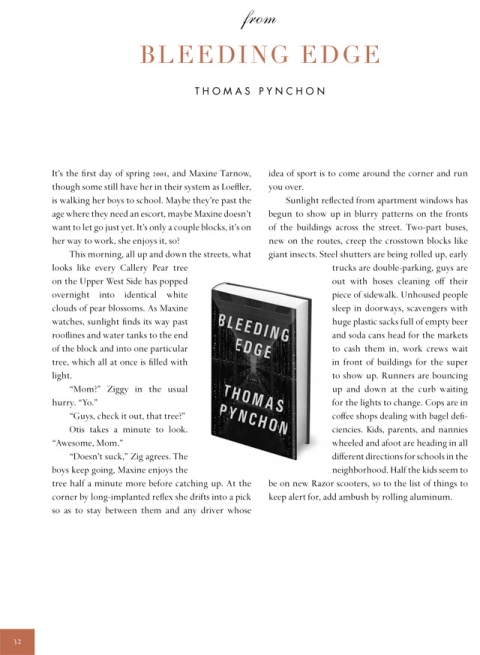Click the image for a larger view. And if it doesn’t get large enough, click it again…
Pynchon. What to say? An all-night marathon reading of Gravity’s Rainbow changed my brain chemistry. A couple days locked in a room with V altered my reality forever. I read the first chapter of Mason & Dixon. Bought and forgot a copy of Against the Day. Scanned a review of Inherent Vice.
So maybe the later Pynchon hasn’t grabbed me, or my leisure reading time has just evaporated. Or both. I’m sure I’m not alone in this. But now we’ve got another chance to gape at the reclusive paranoiac’s labyrinthine prose, since his new novel Bleeding Edge comes out September 17th. And publisher Penguin has thrown us a morsel—you can read the first page of Bleeding Edge (above), from Penguin’s Fall 2013 catalog.
Described as a “historical romance on New York in the early days of the internet,” Bleeding Edge takes place in a pre-lapserian 2001, “in the lull between the collapse of the dot-com boom and the terrible events of September 11th.” The novel promises plenty of intrigue, dark humor, layers of occult foreboding, “lamentations about the ’60s counterculture,” and “shady fascistic organizations with futuristic names.”
Read the full description of Bleeding Edge at Gothamist.
Josh Jones is a writer and musician based in Washington, DC. Follow him @jdmagness



Go back and read all of Mason & Dixon. It is one of the best books I have ever read. The style may seem a little quirky at first but you will soon get used to it. This author is a genius.
“Doesn’t suck,” the kids says. This first page sure does suck, his descriptions are flat and expressed in rote.
Chris Roberts
Thanks, Bob! I’ll definitely give M&D another shot.
Against the day is fantastic as well, works really well as a sort of spiritual prequel to Gravity’s Rainbow
Pynchon jumped the shark.
1st page but 32 at bottom left?
maybe after writing top notch ever since 1965 this guy might sound like he’s not trying, and maybe he isn’t. Being 32 myself and just starting to comprehend how to write this well, I can’t say what I might be capable of after an additional forty years, but hey, TP and the Internet, I am writing about the Net too and would love to see what he does with it.
i love u
Noone speaks of Vineland. Vineland is — among other things — an exclusive operation of renewal of narration. Pairie’s creation of her own role amidst all deterministic historical designs is truly new and deeply relevant for the creation of selfhood in 2014. Postmodern indeterminacy of meaning is arrested, but in a completely new way that makes indeterminacy ethically and socially significant. Is this enough to make you want to reread Vineland?